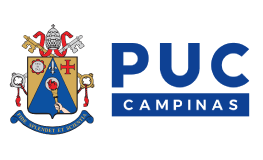Lines of Research:
- Instruments and Processes in Psychological Evaluation
Researches on theoretical and practical aspects that aim the construction, adaptation, and use of instruments and procedures of psychological evaluation, in different areas of actuation.
- Prevention and Psychological Intervention
Researches that aim the study of psychotherapy procedures, the development, follow-up, and evaluation of preventive and intervention programs in the clinical, school, and health areas with theoretical psychodynamic, behavioral, and humanistic focuses.
Objectives
Form high level teaching staff and researchers in the area of Psychology contributing, thus, for the quality of graduation education in the country and for the production of scientific knowledge.
Target Audience
– Students graduated in Psychology and connected areas.
Scholarship Modalities
a) CAPES/MEC: Program of Support to Post-Graduation from Private Education Institutions;
b) CNPq/MCT: Doctor’s Degree (GD);
c) PUC-Campinas/Rectorship: 50% exemption on tuition.
Curricular Structure
For the conclusion of the Master’s Degree in Psychology as Profession and Science, aiming at the title of Master, a total of 32 credits are necessary, attributed as follows:
1) 03 mandatory disciplines of 03 credits, adding up to a total of 09 credits;
2) 03 elective disciplines of 03 credits, adding up to a total of 09 credits;
3) 03 modules of Advanced Research Seminars – mandatory discipline of 02 credits, adding up to a total of 06 credits;
4) Approval on Qualification Exam: at the end of the first year of the Master’s Degree course the student will have to submit his/her dissertation project to a Qualification Exam.
5) Dissertation: 08 credits.
Minimum duration of the Master’s Degree in Psychology as Profession and Science is 12 and maximum 24 months.
Thus, the course progression is distributed as follows:
| 1st semester | 2nd semester | 3rd semester | 4th semester |
|---|---|---|---|
| Mandatory (1) | Mandatory (3) | Elective (3) | Guidance |
| Mandatory (2) | Elective (2) | ARS III | – |
| Elective (1) | ARS II | Guidance | – |
| ARS I | Guidance | – | – |
| Guidance | – | – | – |
History
PUC-Campinas’ Post-Graduation Program in Psychology was created in the end of the 1970s. It originated from a Specialization Course that, when consolidating itself created the opportunity for the development of an Academic Master’s Degree with a concentration area in clinical psychology. From the theoretical point of view the two main approaches already present in the formation of the graduate students of the old Institute of Psychology were respected – behavioral and psycho analytics. The construction of the Master’s Degree Course had the arrival of prestigious professors, renowned as much in Brazil as abroad, who contributed for the formation of the University and the region’s first masters in Clinical Psychology. From the late 1970s to the early 1990s, 125 masters were graduated in Clinical Psychology and the program’s teaching staff integrated fifteen researchers. From the 1990s, due to a growing demand, a new concentration area in the master’s degree was created – school psychology. With the operation of this new area, several changes took place, among them the restructuring of the physical space and amplification of the teaching staff. The diversity of theoretical positions and the context propitious to the scientific debate contributed for the necessary for the maturation of the Program, qualifying it for submission to CAPES of the Doctor’s Degree course proposition that counted with the institutional approval, support, and support. The incentive had come up from the CAPES appraisers themselves who considered that there was maturity enough for the creation of the doctor degree level so as to render the Program a complete one. In 1995, PUC-Campinas Doctor’s Degree in Psychology starts, constituting the first institutional experience in such formation level.
In a procedural and continuous manner, PUC-Campinas answered the evolution of the public policies for the Brazilian higher education and constituting, at its scope, the necessary conditions for the development of research, from the implementation of the Scientific Initiation Program affiliated to PIBIC/CNPq to the implementation of a teaching career prioritizing the full time entailment of all research teaching staff with the University, with half the hours aimed exclusively to the development of research projects in the context of Institutional Research Groups certified along the CNPq Group Directory. In an analogous manner, the College of Psychology throughout the decades has been restructuring its curriculum so as to support not only the area’s guidelines, but also structural changes of the Brazilian society itself with repercussions for the Psychologist’s Professional category. The curricular restructuring aim, among other dimensions, the integration of research to education, of graduation with post-graduation, qualifying the psychologist’s formation in a complete manner and inserting him/her into national debates.
The Stricto Sensu Post-Graduation, on the other hand, adjusted itself to the same demands, reformulating its lines of research and production for providing consistency to the concentration area PSYCHOLOGY AS PROFESSION AND SCIENCE, which started characterizing the Program as a whole from 2005. The present curricular structure remains with a single concentration area and two lines of research – psychological prevention and intervention, and instruments and processes in psychological analysis – to which research groups are integrated and that contemplate the diversity of theories and practices that constitute the profession.








